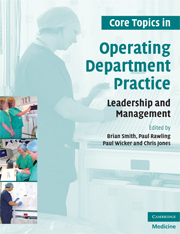Book contents
- Frontmatter
- Contents
- List of contributors
- Foreword
- Preface
- 1 Managing change in perioperative education
- 2 The role of the operating department manager within the context of the organization
- 3 Action learning: a new way of problem solving in perioperative settings
- 4 Agenda for change: what do theatre staff need to know?
- 5 The SWOT analysis: its place in strategic planning in a modern operating department
- 6 Corporate governance: setting the scene for perioperative practice
- 7 Managing different cultures: adversity and diversity in the perioperative environment
- 8 Leadership in perioperative settings: a practical guide
- 9 Management and leadership of advanced practice
- 10 Managing conflict in perioperative settings
- 11 The management and organization of emergency operating lists
- 12 Organizational culture
- 13 Development matters in the NHS; including a perioperative approach to the KSF
- 14 Equipment procurement: a purchaser's guide for theatre managers
- 15 The reflective practitioner in perioperative settings
- 16 New ways of working in perioperative practice
- 17 Damned if you do and damned if you don't: whistle blowing in perioperative practice
- 18 A manager's experience of recruitment and retention
- 19 The management of change
- Index
- References
11 - The management and organization of emergency operating lists
- Frontmatter
- Contents
- List of contributors
- Foreword
- Preface
- 1 Managing change in perioperative education
- 2 The role of the operating department manager within the context of the organization
- 3 Action learning: a new way of problem solving in perioperative settings
- 4 Agenda for change: what do theatre staff need to know?
- 5 The SWOT analysis: its place in strategic planning in a modern operating department
- 6 Corporate governance: setting the scene for perioperative practice
- 7 Managing different cultures: adversity and diversity in the perioperative environment
- 8 Leadership in perioperative settings: a practical guide
- 9 Management and leadership of advanced practice
- 10 Managing conflict in perioperative settings
- 11 The management and organization of emergency operating lists
- 12 Organizational culture
- 13 Development matters in the NHS; including a perioperative approach to the KSF
- 14 Equipment procurement: a purchaser's guide for theatre managers
- 15 The reflective practitioner in perioperative settings
- 16 New ways of working in perioperative practice
- 17 Damned if you do and damned if you don't: whistle blowing in perioperative practice
- 18 A manager's experience of recruitment and retention
- 19 The management of change
- Index
- References
Summary
Key Learning Points
Understand the problem of emergency perioperative provision in NHS trusts
Consider the material and human resources required to deliver efficient emergency perioperative care
Outline the political and professional drivers of change in emergency surgical services
Understand the impact of unexpected events such as major civilian incidents on the rest of the surgical service
Introduction
The management and organization of the emergency operating list is not a static process but a constant process of assessment and priority management. This chapter aims to provide some insight into the organization, management and leadership of such a surgical list.
Prior to the introduction into the NHS of dedicated emergency operating rooms, urgent surgical procedures were commonly left until the end of elective lists. Most of these operations were usually performed by junior grade surgeons without the supervision of an experienced consultant, with the majority of cases being performed out of hours (Wyatt et al. 1990). The Report of a Confidential Enquiry into Perioperative Deaths (CEPOD; Buck et al. 1987) clearly demonstrated the need for increased supervision of junior surgeons. In response to the publication of this paper, many NHS Trusts went on to provide dedicated emergency surgical operating rooms.
Information
- Type
- Chapter
- Information
- Core Topics in Operating Department PracticeLeadership and Management, pp. 82 - 88Publisher: Cambridge University PressPrint publication year: 2009
